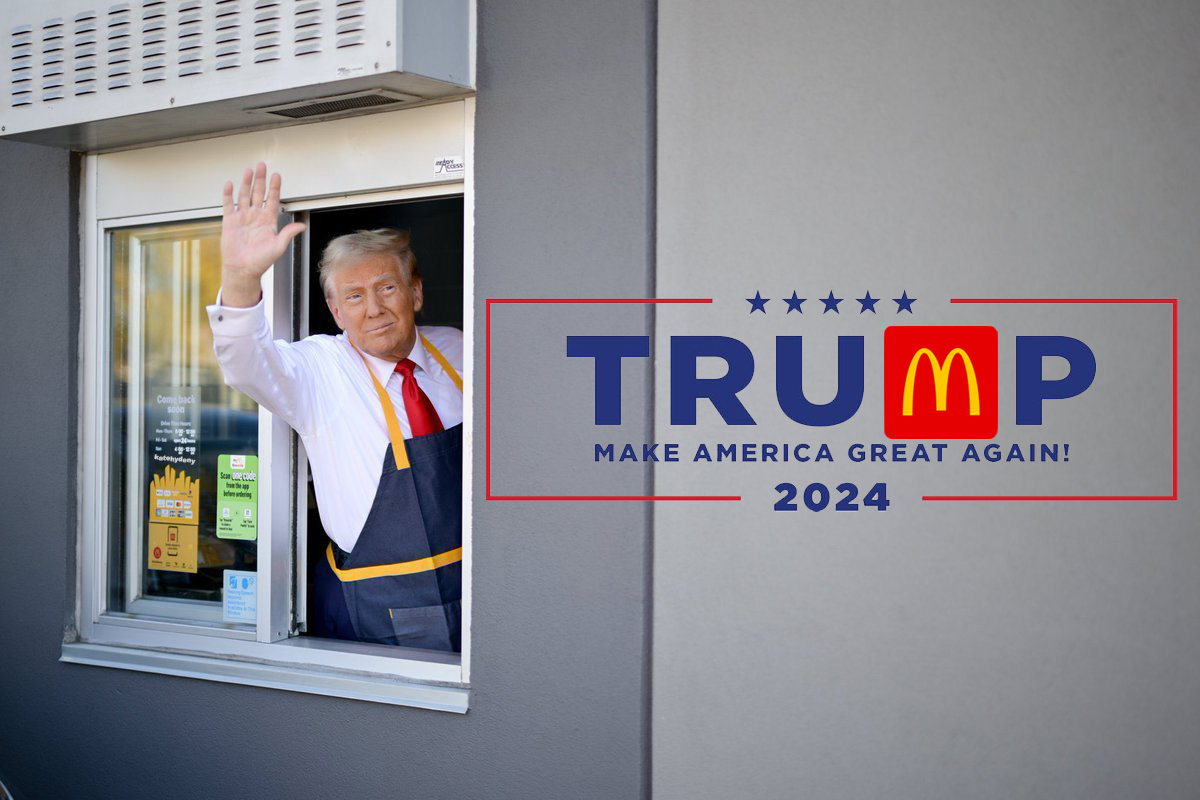Jokes aside, this is one of the most meaningful gestures I’ve ever seen from a political leader. Donald Trump is showing Americans through his actions—not just telling them with words—that every worker is important, that every job matters, and that there’s dignity in all labor,… pic.twitter.com/K06QwK7Jfu
— Robert Sterling (@RobertMSterling) October 20, 2024

Democrats have pulled an uno reverse and are now calling trump physically unfit and claim that he has dementia.
— pika2zero (@ruggedpikachu) October 21, 2024
They say working at mcdonalds is for the plebs and 'unpresidential'.
Also he's a threat to democracy.
Of course none of that makes any sense. These are arguments of… pic.twitter.com/V5wc1tZzCx
GROK:
In a world where every move by a political figure is under the microscope, former President Donald Trump’s recent visit to McDonald’s has become more than just a fast-food run. This unorthodox and hilarious event, taking place amidst an already polarized political landscape, has sparked a myriad of reactions, serving as a perfect case study in how public acts are interpreted through the lens of political bias.
This is the crowd outside of @McDonalds in Pennsylvania where President Trump is working today.
— Laura Loomer (@LauraLoomer) October 20, 2024
After his shift at McDonalds today, Trump is hosting a town hall and then he’s going to the Steeler’s game. pic.twitter.com/ViRjYriv9u
The Political Left’s Outrage: For many on the political Left, Trump’s McDonald’s escapade was less about solidarity with the working class and more about showcasing his perceived decline. Critics have pointed fingers at what they see as signs of cognitive impairment or, at best, a cry for attention that lacks the sophistication expected from a former U.S. President. “This is just another example of Trump’s desperate bid to remain relevant,” commented a political analyst on MSNBC. The act was dissected as an attempt to maintain visibility, albeit through increasingly bizarre means, reflecting a figure out of touch with presidential norms.
The Right’s Rallying Cry: Conversely, supporters and many on the Right saw genius in the simplicity. Trump, they argue, was not only trolling Vice President Kamala Harris, known for her uncomfortable moments with fast food, but also reinforcing his image as a man of the people. “This was Trump at his best,” remarked a commentator on Fox News, “a direct, in-your-face rebuke to elitism, showing he’s still one with the everyday American.” This perspective paints the visit as a calculated move, aligning Trump with the blue-collar demographic, celebrating his relatability over traditional political posturing.
A Divided Nation’s Symbolism: The disparity in reactions highlights a deeper truth about modern American politics—symbolism often trumps substance. Trump’s McDonald’s visit wasn’t just about grabbing a quick bite; it was a statement, a political act wrapped in a fast-food wrapper. For his detractors, it’s a sign of fallibility or pandering; for his supporters, it’s a reminder of his promised connection to the common citizen.
The Cultural Impact: Beyond the immediate political bickering, this event serves as a cultural Rorschach test. How one views this act—be it as a desperate grasp for relevance or a brilliant stroke of populism—reveals much about one’s political identity and the narratives they subscribe to. In an age where every tweet, every appearance, and every speech is analyzed to death, Trump’s McDonald’s moment stands out because it defies the traditional playbook, forcing observers to interpret it through their own ideological filters.
“I was talking to RFK Jr, you know he endorsed me, he’s a big Trump guy now. MAHA they call it, Make America Healthy Again. He was telling me these seed oils in the fryers are toxic. We want them OUT! They used to be made in beautiful tallow. We’re going to bring the tallow back… pic.twitter.com/B2xSPysgLf
— Seed Oil Disrespecter™️ (@SeedOilDsrspctr) October 20, 2024
Conclusion: In the annals of political stunts, Trump’s McDonald’s visit might not rank as the most significant, but it certainly marks one of the most telling. It underscores a pivotal aspect of contemporary politics: the power of the seemingly insignificant in shaping public discourse. Whether seen as a stroke of genius or a lapse in judgment, what remains clear is that in the politically charged atmosphere of today, even a visit to McDonald’s isn’t just about the food—it’s about the message, the medium, and the myriad interpretations thereof.